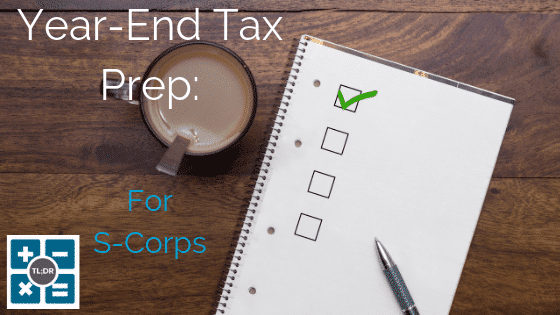There are specific steps you can do at the end of the year to legally reduce your company’s tax liability. As long as the tax reduction is greater than the value of the time and money you put into these steps, it can be great for your bottom line! Indeed, some deductions were specifically put into place by the government in order to incentivize small business owners.
Year End Prep for S-Corps
- Many business owners go on a shopping spree at the end of the year in order to reduce their taxes by taking business expense deductions on what they buy. A few things to keep in mind:
- Are the things you are buying ordinary and necessary for the operation of your business? If not, the IRS could disallow some of these items.
- Consider that your goal should be to maximize your after-tax profits, not to minimize tax paid. Regardless of whether your money is going to the IRS or to Office Depot, it’s still ultimately coming out of your company’s bank account.
- Shopping sprees and other tricks that you can use to shift income and expenses from one year to the next (or previous) year can help you if your marginal tax rate changes. The marginal tax rate is the tax you would spend on one additional dollar of income.
- You can legitimately reduce your tax liability while building your nest-egg by putting money into retirement accounts, but the cash must leave your account before December 31st. Every year that goes by without a retirement contribution is permanently lost tax savings! (There are some options if you miss this deadline!)
- Do you have any customers who went bankrupt, or simply refuse to pay you? Writing off receivables as bad debt expense can get you a tax deduction.
- There is a 20% pass-through deduction for small business owners from the Tax Cuts and Jobs Act; check with a tax professional for details.
- Depreciation acceleration options are available to you: 100% bonus depreciation on new and used property, as well as the separate Section 179 deduction. Of course, any accelerated depreciation means that you will forego depreciation expenses in future years.
- You can write off obsolete equipment and inventory for a tax deduction. Writing off obsolete equipment has the added bonus of reducing your business personal property tax bill, at least in Washington State.
TL;DR: Rather than a year-end shopping spree, your December time and money might be better spent putting away money into your nest egg, claiming bonus depreciation, and writing off receivables, inventory, or equipment.






